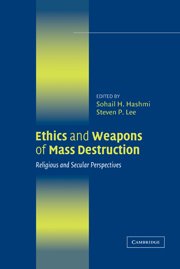Book contents
- Frontmatter
- Contents
- Tables and Figures
- Acknowledgments
- Abbreviations
- Ethics and Weapons of Mass Destruction
- Introduction
- 1 Weapons of Mass Destruction: A Brief Overview
- 2 The International Law Concerning Weapons of Mass Destruction
- PART ONE THE ORIGINAL DEBATE
- 3 Realist Perspectives on Ethical Norms and Weapons of Mass Destruction
- 4 Realism and Weapons of Mass Destruction: A Consequentialist Analysis
- 5 Natural Law and Weapons of Mass Destruction
- 6 War and Indeterminacy in Natural Law Thinking
- 7 Liberalism: The Impossibility of Justifying Weapons of Mass Destruction
- 8 A Liberal Perspective on Deterrence and Proliferation of Weapons of Mass Destruction
- 9 Christianity and Weapons of Mass Destruction
- 10 Christian Apocalypticism and Weapons of Mass Destruction
- PART TWO EXPANDING THE CONVERSATION
- PART THREE CRITICAL PERSPECTIVES
- Contributors
- Index
10 - Christian Apocalypticism and Weapons of Mass Destruction
Published online by Cambridge University Press: 05 June 2012
- Frontmatter
- Contents
- Tables and Figures
- Acknowledgments
- Abbreviations
- Ethics and Weapons of Mass Destruction
- Introduction
- 1 Weapons of Mass Destruction: A Brief Overview
- 2 The International Law Concerning Weapons of Mass Destruction
- PART ONE THE ORIGINAL DEBATE
- 3 Realist Perspectives on Ethical Norms and Weapons of Mass Destruction
- 4 Realism and Weapons of Mass Destruction: A Consequentialist Analysis
- 5 Natural Law and Weapons of Mass Destruction
- 6 War and Indeterminacy in Natural Law Thinking
- 7 Liberalism: The Impossibility of Justifying Weapons of Mass Destruction
- 8 A Liberal Perspective on Deterrence and Proliferation of Weapons of Mass Destruction
- 9 Christianity and Weapons of Mass Destruction
- 10 Christian Apocalypticism and Weapons of Mass Destruction
- PART TWO EXPANDING THE CONVERSATION
- PART THREE CRITICAL PERSPECTIVES
- Contributors
- Index
Summary
Nigel Biggar has done an excellent job in the previous chapter of summarizing the long history of Christian thought about war and weapons of mass destruction. He has skillfully analyzed the contributions of major thinkers within the Christian tradition to the moral evaluation of nuclear and other weapons of mass destruction in this century. I dispute none of what he said and could offer only further elaboration on the points he made if I attempted to deal with the history, traditions, and thinkers he addressed.
Instead, I wish to augment his treatment by adding a modern Christian perspective radically different from those he considers. Biggar's treatment dealt with the major traditions of the Christian past – Roman Catholic and so-called mainline Protestant. I wish to turn to those movements within Christianity that are now growing most rapidly and spreading most broadly, and which are most likely to shape at least popular Christianity's future.
These are Evangelical Protestantism and the Pentecostal/Charismatic traditions of Christianity and, in particular, the view of history and interpretation of biblical prophecy known as “dispensationalist” within those communities. While the number of adherents to Roman Catholicism and mainline Protestantism is generally declining in North America and Western Europe, the newer traditions are aggressive in their missionary activities and highly effective in spreading their message throughout the world.
- Type
- Chapter
- Information
- Ethics and Weapons of Mass DestructionReligious and Secular Perspectives, pp. 200 - 210Publisher: Cambridge University PressPrint publication year: 2004
- 1
- Cited by

